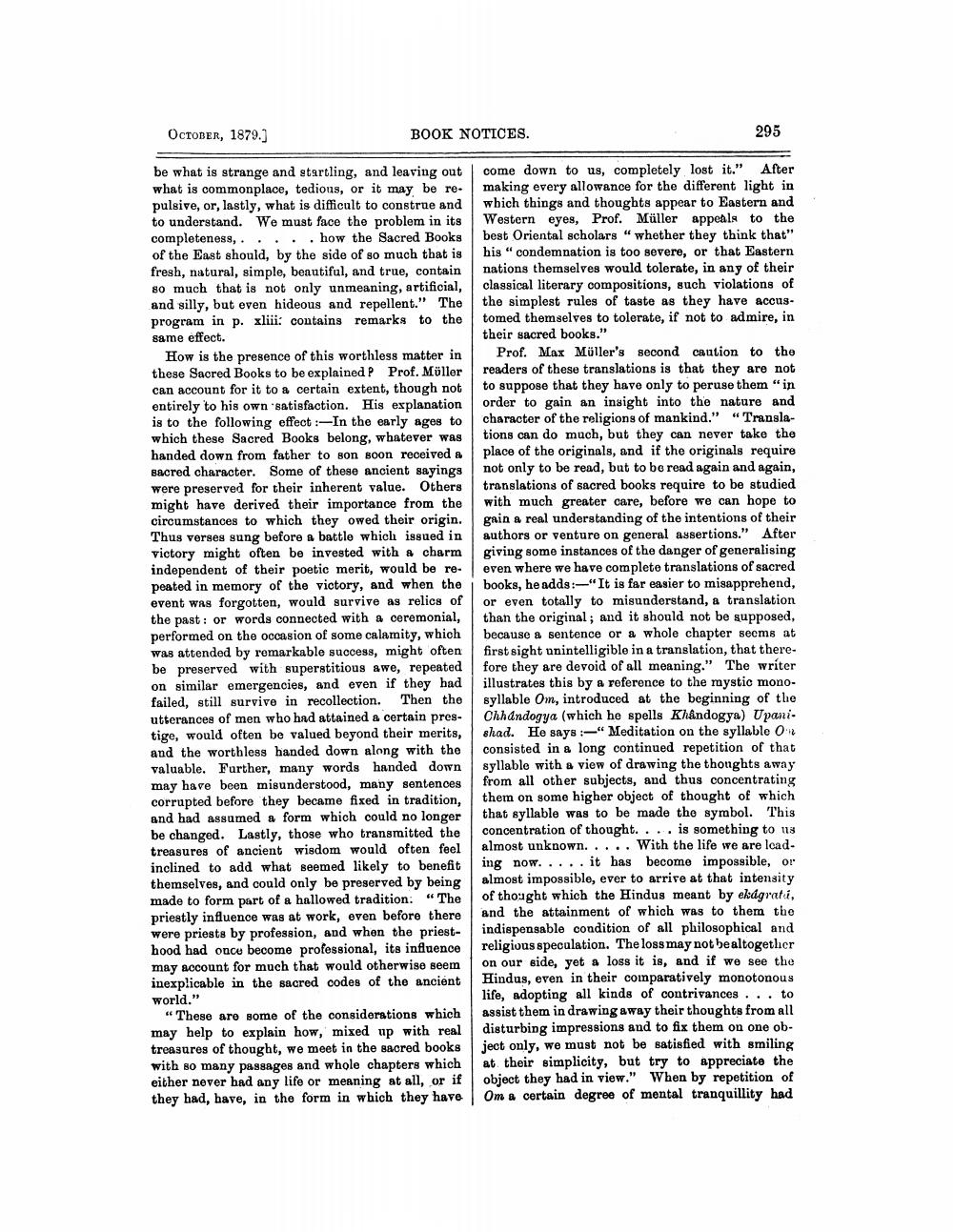________________
OCTOBER, 1879.]
BOOK NOTICES.
295
be what is strange and startling, and leaving out come down to us, completely lost it." After what is commonplace, tedious, or it may be re- making every allowance for the different light in pulsive, or, lastly, what is difficult to construe and which things and thoughts appear to Eastern and to understand. We must face the problem in its Western eyes, Prof. Müller appeals to the completeness,.....how the Sacred Books best Oriental scholars " whether they think that" of the East should, by the side of so much that is his "condemnation is too severe, or that Eastern fresh, natural, simple, beautiful, and true, contain nations themselves would tolerate, in any of their 80 much that is not only unmeaning, artificial, classical literary compositions, such violations of and silly, but even hideous and repellent." The the simplest rules of taste as they have accus. program in p. xliii: contains remarks to the tomed themselves to tolerate, if not to admire, in same effect.
their sacred books." How is the presence of this worthless matter in
Prof. Max Müller's second caution to the these Sacred Books to be explained P Prof. Möller readers of these translations is that they are not can account for it to a certain extent, though not to suppose that they have only to peruse them "in entirely to his own satisfaction. His explanation order to gain an insight into the nature and is to the following effect :-In the early ages to character of the religions of mankind." "Translawhich these Sacred Books belong, whatever was tions can do much, but they can never take the handed down from father to son soon received a place of the originals, and if the originals require sacred character. Some of these ancient sayings not only to be read, but to be read again and again, were preserved for their inherent value. Others translations of sacred books require to be studied might have derived their importance from the with much greater care, before we can hope to circumstances to which they owed their origin. gain a real understanding of the intentions of their Thus verses sung before a battle which issued in authors or venture on general assertions." After victory might often be invested with a charm giving some instances of the danger of generalising independent of their poetic merit, would be re- even where we have complete translations of sacred peated in memory of the victory, and when the books, he adds:-"It is far easier to misapprehend, event was forgotten, would survive as relics of or even totally to misunderstand, a translation the past: or words connected with a ceremonial, than the original; and it should not be supposed, performed on the occasion of some calamity, which because a sentence or a whole chapter seems at was attended by remarkable success, might often first sight unintelligible in a translation, that therebe preserved with superstitious awe, repeated fore they are devoid of all meaning." The writer on similar emergencies, and even if they had illustrates this by a reference to the mystic mono. failed, still survive in recollection. Then the syllable Om, introduced at the beginning of the utterances of men who had attained a certain pres. Chhandogya (which he spells Khandogya) Upani. tige, would often be valued beyond their merits, shad. He says :-"Meditation on the syllable or and the worthless handed down along with the consisted in a long continued repetition of that valuable. Further, many words handed down syllable with a view of drawing the thonghts away may have been misunderstood, many sentences from all other subjects, and thus concentrating corrupted before they became fixed in tradition, them on some higher object of thought of which and had assumed a form which could no longer that syllable was to be made the symbol. This be changed. Lastly, those who transmitted the concentration of thought.... is something to 113 treasures of ancient wisdom would often feel almost unknown..... With the life we are lcad. inclined to add what seemed likely to benefit ing now..... it has become impossible, or themselves, and could only be preserved by being almost impossible, ever to arrive at that intensity made to form part of a hallowed tradition. “The of thought which the Hindus meant by ekágrati, priestly influence was at work, even before there and the attainment of which was to them the were priests by profession, and when the priest- indispensable condition of all philosophical and hood had oncu become professional, its influence religious speculation. The loss may not be altogether may account for much that would otherwise seem on our side, yet a loss it is, and if we see the inexplicable in the sacred codes of the ancient Hindus, even in their comparatively monotonous world."
life, adopting all kinds of contrivances ... to “These are some of the considerations which assist them in drawing away their thoughts from all may help to explain how, mixed up with real disturbing impressions and to fix them on one obtreasures of thought, we meet in the sacred booksject only, we must not be satisfied with smiling with so many passages and whole chapters which at their simplicity, but try to appreciate the either never had any life or meaning at all, or if object they had in view." When by repetition of they had, have, in the form in which they have Om a certain degree of mental tranquillity had




